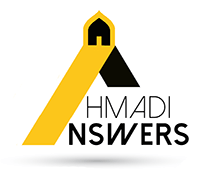
Name of the Imam Mahdi
Many ask about the name of the Imam Mahdi and say that was it not supposed to be Muhammad Ibn Abdullah and that the Imam Mahdi would be an Arab. If a person comes today, whose name is Muhammad and his father is Abdullah and his mother’s name is Amina, would the Muslims accept him? It is obvious that no one would accept him based on this premise. Nor is this what the hadith says. Let us take sign step by step.
Firstly, in Khana Kaba, a person claimed to be the Imam Mahdi and his name was Muhammad, his father’s name was Abdullah and his mother’s name was Amina. All present should have accepted him. However, he was killed right there and was not even able to leave Mecca.
In regards to this narration, there is not only one name mentioned. The narrations give the Imam Mahdi countless of names. This shows that the names are attributive names, not physical names. Prophecies of Prophets mention attributive names and this is the way of the Prophets of the past as well.
Imagine a person is named Muhammad and he marries Amina and names his son Muhammad. Who would accept him? One of the names of the Prophet (sa) was Ahmad as well and this does agree with the name of the Prophet (sa). One of the name of Hadhrat Ahmad (as) was also Muhammad by way of reflection, since he resembled the Prophet(sa). The Mahdi is also called the Messiah, Dhul Qarnain, Ahmad, Muhammad, and Imam ul Qaim. We should focus on the signs and see who fulfills all of these signs. For example, the signs of the eclipses.
If we take every narration literally, we will never reach anywhere. For example, the Prophet (sa) said he would be buried with me in my grave. Can anyone ever believe that the grave of the Prophet (sa) would be opened? Of course not. It was a phrase to show the resemblance the Imam Mahdi would have with the Messiah. Secondly, this means the truth of the mahdi cannot be shown until he dies and is buried since it would not be fulfilled in him. Who would bury him there?
Hadhrat Ahmad (as) is the fulfillment of the Imam Mahdi about whom the Prophet (sa) said there is no Mahdi except Isa. The Mahdi who would have eclipses for him and break the cross and kill the swine. The other ahadith have to be interpreted. Many scholars said these titles refer to the closeness the Messiah would have to the Prophet (sa). Like we say, his father is our father. We are not two, we are one. If you mock him, you have mocked me. These ahadith simply show how close they would be. Like Hadhrat Ahmad (as) said whoever differentiates between me and Mustafa (sa), he has not seen or recognized me. This is metaphorical which hints to the love the Mahdi and the Prophet had for each other.
If we don’t take these meanings, and take everything literally we will put ourselves into trouble. Hadhrat Ahmad (as) himself explained this in his book Nuzulul Masih page 381, on the footnote. He explained that the Prophet (Sa) said the Mahdi and Messiah would have my name and not bring a new name, meaning he would not bring a new law rather would have the cloth of the Prophethood of Muhammad (sa) and his life would be like the life of the Prophets and he would die in the name of the Prophet (Sa), so it is known that he is not a new person rather a spiritual second coming, as Sahih Bukhari tells us.
If someone continues to insist and wants the literal fulfillment, then Hadhrat Ahmad (as) name was the same as the Prophet Muhammad (sa) because he (sa) was also called Ahmad. He (sa) fathers name was Abdullah (slave of Allah) and the name of the father of Hadhrat Ahmad (as) was Ghulam Murtadha, the slave of Muhammad (sa). These two names also resemble because all true slaves of Allah are also slaves of the Prophet (sa).
The hadith says that the Mahdi would be of the Prophet Muhammad (sa) and his father’s name would agree with the name of the Prophet (sa) and his name would agree with the name of the Prophet (sa). As for him being Arab, Bukhari makes it clear that the Imam Mahdi would be of Persian lineage, not Arab
Majority of the ahadith just say his name will be my name. The father name is an addition and not present in the other ahadith.
For example, in Musnad Ahmad it is narrated:
حدثنا عبد الله، حدثني أبي، ثنا سفيان بن عيينة، ثنا عاصم، عن زر، عن عبد الله، عن النبي ﷺ: «لا تقوم الساعة حتى يلي رجل من أهل بيتي يواطئ اسمه اسمي».” (مسند أحمد، ج 1، ص 377)
Here it simply says his name will resemble my name. There is no mention of the fathers name being the same in the other narrations. However, we have no issue in accepting both signs. These signs are meant to be taken in the spiritual sense showing the blessed qualities of the Imam Mahdi (as).
In Tirmidhi, it is narrated:
اَ تَذْهَبُ الدُّنْيَا حَتَّى يَمْلِكَ الْعَرَبَ رَجُلٌ مِنْ أَهْلِ بَيْتِي يُوَاطِئُ اسْمُهُ اسْمِي
‘Abdullah narrated that the Messenger of Allah(s.a.w) said: “The world shall not pass away until a man from the people of my family rules the Arabs whose name agrees with my name.” (Jamia’t Tirmidhi, Hadith #2230)
Then again in Tirmidhi we have:
يَلِي رَجُلٌ مِنْ أَهْلِ بَيْتِي يُوَاطِئُ اسْمُهُ اسْمِي
“وأمّا توارد اسم الأبوين كما جاء في حديث نبيّ الثقلَين، فاعلم أنه إشارة لطيفة إلى تطابُق السرَّين من خاتم النبيين. فإن أبا نبينا صلى الله عليه وسلم كان مستعدّا للأنوار فما اتفق حتى مضى من هذه الدار، وكان نورُ نبيّنا موّاجًا في فطرته، ولكن ما ظهر في صورته، والله أعلم بسرّ حقيقته، وقد مضى كالمستورين. وكذلك تشابهَ أبُ المهدي أبَ الرسول المقبول.” (سر الخلافة)
“واعلم أن المراد من مواطأة الاسمين مواطأة روحانية لا جسمانية فانية، فإن لكل رجل اسم في حضرة الكبرياء، ولا يموت حتى ينكشف سرّ اسمه سعيدًا كان أو من الأشقياء والضالين. وقد يتفق توارُدُ أسماء الظاهر كما في “أحمد” و”أحمد”، ولكن الأمر الذي وجَدْنا أحقّ وأنشد، فهو أن الاتحاد اتحاد روحاني في حقيقة الاسمين، كما لا يخفى على عارفٍ ذي العينين.” (سر الخلافة)
Even if there was only one day left in the world, Allah would extend it until He has sent someone from me or from my progeny. His name shall be like mine, and the name of his father shall be like my father’s]. This is narrated by Abu Dawud, one of the great Imams of Hadith. The words ‘from me’ and ‘his name shall be like my name’ indicate what I have explained previously. Think like a seeker of the light. If you desire that the mysteries of the truth be revealed to you, do not overlook this point and do not restrain your eyes like the wrongdoers. Know that the similarity in names is a spiritual likeness and not a transient or physical one. Every person has a name in the eye of Allah and he does not die until the secret of his name has become manifest as to whether he was among the fortunate ones or the unfortunate and misguided ones. Sometimes, two persons can have the same names, such as ‘Ahmad’ and ‘Ahmad’, but what I have found more correct and acceptable is that the union of the two names is spiritual. This is well known to those with spiritual insight. (Secret of Khilafat, page 89-90)
As for the likeness in the names of the fathers which is mentioned in the hadith, you must realise that this points to a subtle affinity with Khatamun-Nabiyyin [the Seal of the Prophets] in two respects. The first is that the father of our Prophet, may peace and blessings of Allah be upon him, was ready to receive the light of faith but left this world before he was able to do so. As such, the light of our Prophet (sa)’s was imbued in his nature but it did not appear in his actual experience, and only Allah knows the reality of his true nature since he departed in obscurity. In this respect, the father of the Mahdi resembles the father of the beloved Prophet (sa). Ponder over these matters like a rational person and do not turn away in haste. (Secret of Khilafat, page 90-91)


